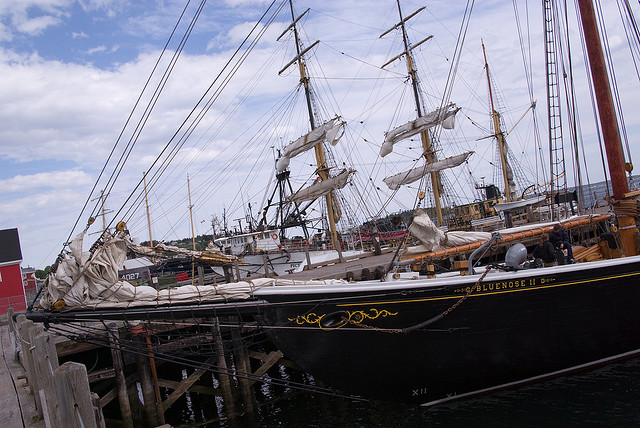
We took a whale watching boat in Lunenburg. As we pulled away from the pier, the tour guide talked about the history of the town. How many boats used to go out. Where the fish came in. Until the big fishing boats came, and drove out that way of life. He said, the old fisherman knew, they said that would be the end of the fish. They were proven right. It’s getting better, now. But it will never be like what it was.
In medicine, there’s the concept – do no harm. We don’t have that in technology. We create things! They’re wonderful! We’re sure we know better than the luddites. But, sometimes we’re wrong.
How do you know, though? Weren’t the Catholic objections to the printing press in a similar vein? Save the scribes! (See Here Comes Everybody – Amazon). Really, they were likely afraid of the spread of information. And with the over-fishing, we’re talking about depleting natural resources. I think in general innovation that increases the amount of information people have is good, and that we need to be more careful with our natural resources… but it’s not all clear cut. When I saw Freeman Dyson speak at the Perimeter Institute he talked about how he did not think the atomic bombing of Hiroshima had ended the war. Key quote from that article:
So in that sense the atomic bombing was unnecessary. Of course we had no way of knowing that then.
Thinking about innovating without knowing the consequences bought me to two things. The first – why I don’t want to live in the valley. I think that in order to build things for humans, we need to live amongst them. The attitude of observing from afar and thinking we know better is not a good thing. As Don Norman puts it, we fill much needed holes.
The second, education. I increasingly think that we can’t trust educating to educators. The system is too bureaucratic and slow moving. Excessive unionization has entrenched mediocrity. I think things like the Khan Academy are the future.
What do we gain from a system like that? Scale. Quality. Flexibility. A smaller number of passionate people who actually know their stuff will pass that knowledge and hopefully that passion on. Students will no longer be at a disadvantage due to terrible teachers. They’ll be able to work at a pace and with a structure and format that works best for them.
In 20 years of education, I had a number of appalling teachers, and most of them were – at best – mediocre. It seems like saving students from that would be a good thing.
But, thinking about what we might lose, I think about the couple, two, actually, of extraordinary teachers, who knew their stuff and shared their passion with me. I was lucky to have that. A tiny minority of those who made up my educational experience, true. But the ones I remember. It seems like you could create an environment when every teacher for every class was like that, and that would be extraordinary. But the would be no one-on-one personal connection with any of them. And that, is what we’d lose.

2 replies on “First, Do No Harm”
Education is doing what is supposed to be doing. Folks have been saying this for quite a while, but Seth Godin summed it up again today: http://sethgodin.typepad.com/seths_blog/2011/09/back-to-the-wrong-school.html — Ken Robinson is another famous person advocating for deep change in education, and there are others.
Yes! I read that article the day after I wrote this, and it’s so true. The education system is so depressing.